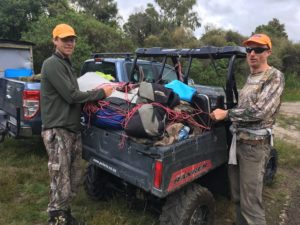I never imagined I’d take a photo with a deer head on an ATV in the name of conservation in New Zealand! But that’s how I rolled with Red and Carpie on a Fish & Game New Zealand assignment in North Island’s Tongariro National Forest. Given that conservation is a former pastime of mine in Maui, Hawai’i—this adventure brought me back to memory lane.
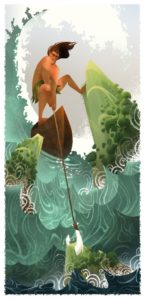 The North Island is known by the Mauri people as Te Ika a Maui, meaning fish of Maui. According to Polynesian mythology, Maui (the island in Hawai’i) was also named after Maui (the demigod) who fished islands out of the sea. If you saw the Disney film, Moana, this story may ring a bell!
The North Island is known by the Mauri people as Te Ika a Maui, meaning fish of Maui. According to Polynesian mythology, Maui (the island in Hawai’i) was also named after Maui (the demigod) who fished islands out of the sea. If you saw the Disney film, Moana, this story may ring a bell!
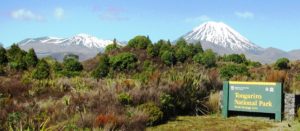 In the middle of North Island, are 3 volcanoes spiritually significant to Maori. These volcanoes were also considered demigods like Maui. Eventually this area became the first National Park of New Zealand. It was the only way Maori could protect their sacred land, which is named after the largest volcano in the group, Mount Tongariro.
In the middle of North Island, are 3 volcanoes spiritually significant to Maori. These volcanoes were also considered demigods like Maui. Eventually this area became the first National Park of New Zealand. It was the only way Maori could protect their sacred land, which is named after the largest volcano in the group, Mount Tongariro.
Carpie’s role with Fish & Game New Zealand is monitoring and protecting the watershed habitat in the surrounding Tongariro National Forest and beyond. My buddy Red played an official role as Carpie’s assistant, while I was their, ahem, tagalong blog reporter and native bird spectator.
Carpie, also known as Adam, is native to Washington in the United States. He received his nickname Carpie after completing a PhD researching non-native carp invasion in New Zealand’s freshwater habitats. Carpie has worked in natural resource management in New Zealand ever since. I myself once worked as a Field Biologist and Naturalist—many years ago in Maui. In fact, both Hawai’i and New Zealand share similar ecologies and culture. Upon my arrival to New Zealand, I was surprised how easily I identified common genus names of native plants from both places, such as Pandanus and Metrosideros. Unfortunately what was most familiar to me was the environmental impacts. On the North Island, you simply can’t miss it. Environmental issues are rampant between the clearcutting, overgrazing, and heavy use of poisons on trail systems to attempt killing off feral rats, ferrets and possums.
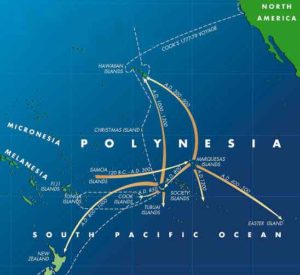
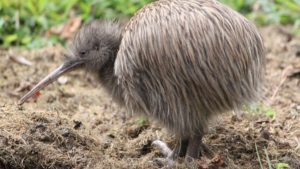 Given New Zealand and Hawai’i are remote, isolated islands in the Pacific, it’s common for native Polynesian plants to lack defenses, like thorns and poisons. Many birds evolved to become flightless, like the iconic Kiwi bird (photo above). Unfortunately, the wide majority of British introduced animals and plants became pests in sensitive island ecologies. The opossums, rats, ferrets, deers and boars—all contribute to the mass extinction of native birds, lizards, fish and plants in Polynesia. For instance, if red deer overpopulate, they can overtrample bird nests and cause enough erosion to impact water quality and fish. Other introduced game species like rainbow trout and mallards, which Fish & Game New Zealand monitor and manage, have had far less environmental impact and benefit the economy. Fern-fed venison, bush bacon, and opossum fur coats are essentially byproducts of conservation here in New Zealand.
Given New Zealand and Hawai’i are remote, isolated islands in the Pacific, it’s common for native Polynesian plants to lack defenses, like thorns and poisons. Many birds evolved to become flightless, like the iconic Kiwi bird (photo above). Unfortunately, the wide majority of British introduced animals and plants became pests in sensitive island ecologies. The opossums, rats, ferrets, deers and boars—all contribute to the mass extinction of native birds, lizards, fish and plants in Polynesia. For instance, if red deer overpopulate, they can overtrample bird nests and cause enough erosion to impact water quality and fish. Other introduced game species like rainbow trout and mallards, which Fish & Game New Zealand monitor and manage, have had far less environmental impact and benefit the economy. Fern-fed venison, bush bacon, and opossum fur coats are essentially byproducts of conservation here in New Zealand.
In a fast ATV, we roamed across thick dense bush, to test Whanganui watershed’s water quality. While Carpie worked tirelessly to finish his water sampling transects, I birdwatched for wood pigeons, fantails, tui, blue duck, and songbirds. In between each test site, Red and Carpie simultaneously scouted out signs of deer and pig. This gave them a good sense for where they could locate good hunting grounds at the end of the work day.
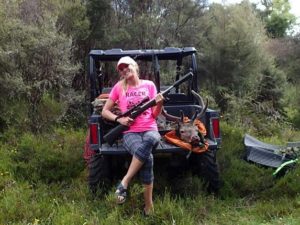 The next day Carpie took down a 2-year old stag with velvet antlers. This equated to 40 pounds of meat he could put on the table for his family. Although, first, it must go in the freezer!
The next day Carpie took down a 2-year old stag with velvet antlers. This equated to 40 pounds of meat he could put on the table for his family. Although, first, it must go in the freezer!
While the stag’s head awkwardly sat at our campsite, Red and Carpie thought it would be funny to stage me with a rifle. There I was wearing a pink paddling shirt, yoga pants and chaco sandals. That’s as close to Kardashian redneck as anyone can get!
I myself am not much of a hunter, nor am I ashamed of it. First of all, I make a terrible shot because I tend to look through the left eye when I pull the trigger on my right side. I learned this about myself when practicing in a shooting range in Alaska. I used to carry a rifle for brown bear protection as a Naturalist. I much prefer the ‘hey bear!’ protocol and pepper spray for defense. Guns are not for me. But this doesn’t mean I’m opposed to hunting if it’s done ethically, legally, using best management practices and conservation compliance. To me, harvesting your own meat sustainably has far less impact than purchasing overfished fish and industrial meat from the supermarket. Industrial meat tends to be over-processed with chemicals, GMOs, and heaps of plastic packaging in factory environments—where animals can’t live animal lives. I recommend everyone to witness first hand the life cycle reality of industrial meat and dairy. There’s strong odds you’ll be horrified by dairy calf killing or awful living environments. In the past I’ve considered vegetarianism, even veganism. But as an official omnivore, I now vouch plant-based diets with supplemental sustainable meat.
Here in New Zealand, I mostly struggle with the overproduction of dairy cattle and deforestation for farming. 98% of kiwi milk goes to China. The big picture of New Zealand’s economy is fully reliant on feeding China. Not that America’s economic relationship with China is any better! China essentially molded its greedy economic behavior after America.
The big question is who is going to feed a rapidly growing, affluent China in the future? New Zealand? Let’s hope not. The demigod Maui may need to return to fish a whole other planet out of the Pacific ocean.
Beyond China’s appetite, omnivore residents in New Zealand can rest assure that hunting deer and pig in native bush is a good sustainable option! It’s not that bad of a deal to justify protecting native wildlife to feed your family for free (with a permit from the Department of Conservation).
All in all, my favorite part of this adventure was making connections in the great outdoors. I connected to the land I was on and the food I was eating. I especially loved connecting to the people I was with. Camping under a big rain fly during a lightning-thunder storm while laughing over a little whisky and ‘talking story‘ (Hawai’ian lingo). Sometimes nothing really quite compares to just how awesome and raw it feels to be out there in the wild connecting with your friends!

Tongariro volcano
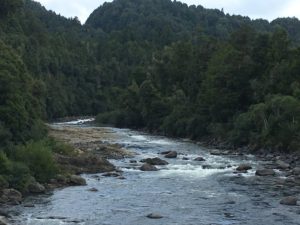
Listening to rare Blue Ducks fly over the Whangaui River
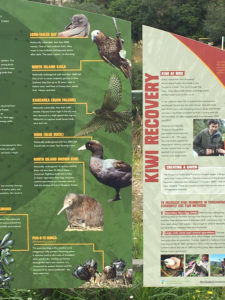
Department of Conservation (DOC) signage about recovery of kimi and other native birds near Whanganui Rv.

The Kardashian redneck in chacos staging a pose
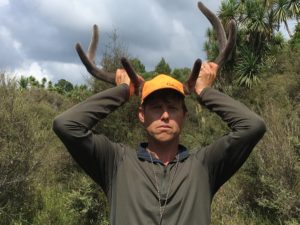
Carpie and the velvet antlers
